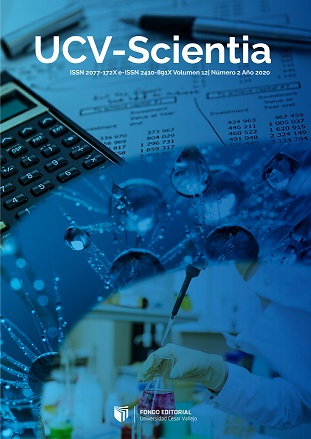Study plan and labor market insertion of agricultural and livestock graduates at institutes from the Lima region
DOI:
https://doi.org/10.18050/revucv-scientia.v12i2.806Keywords:
Study plan, Agricultural and livestock production, Labor market insertionAbstract
The purpose of this paper is to analyze the study plan in the labor market insertion of agricultural and livestock production graduates in public institutes of higher technological education from the Lima Region. The research begins with a documentary analysis of the agricultural and livestock production study plans, which has allowed us to understand the problem. The research carried out corresponds to the qualitative approach because it is pragmatic, interpretative and based on the experiences of the people interviewed. The conceptual framework is based on the competency-based approach, using the interview guide as an instrument, which was applied to directors and teachers of the institutes that offer the agricultural production studies program, as well as to representatives of the productive sector. At the end of the interview, information from the people involved was triangulated, which led us to reach the conclusions regarding the study plan and labor market insertion of agricultural and livestock production graduates in the public institutes of higher technological education from the Lima Region. From the results obtained, we can conclude that there are units of competence proposed in the study plan that are not linked to the requirements of the labor market. In addition, for the development of the didactic units of these competencies, qualified teachers and basic equipment are required, in accordance with the geographic conditions where the institute is located.
References
Aguilar Gavira, S., & Barroso Osuna, J. M. (2015). Data triangulation as a strategy in educational research. Pixel-Bit. Media and Education Magazine, 47, 73-88. Recuperado de https://www.redalyc.org/pdf/368/36841180005.pdf
Bermúdez, L. T., & Rodríguez, L. F. (2013). Research in business management. Ecoe Editions
Callejas, J., Carballo, E., Lujan, J., & Callejas Sabatés, J. (2017). Metodología del diseño curricular basado en competencias profesionales. Revista Científica Epistemia, 1(1), 1-13. Recuperado de http://revistas.uss.edu.pe/index.php/EPT/article/view/573.
CEPAL, N. (2013). Estrategia de transversalización de la perspectiva de género en la Comisión Económica para América Latina y el Caribe (CEPAL), 2013-2017.
Díaz-Barriga, Á. (2014). Construcción de programas de estudio en la perspectiva del enfoque de desarrollo de competencias. Perfiles educativos, 36(143), 142-162.
De Gialdino, I. V. (2019). Qualitative Research Strategies: Volume II. Editorial Gedisa.
Díaz-Bravo, L., Torruco-García, U., Martínez-Hernández, M., & Varela-Ruiz, M. (2013). La entrevista, recurso flexible y dinámico. Investigación en educación médica, 2(7), 162-167.
Hernández, R., Fernández, C., & Baptista, L. (2016). Metodología de la investigación (6ta edición ed.).
Katayama Omura, R. J. (2014). Introducción a la investigación cualitativa: fundamentos, métodos, estrategias y técnicas. Universidad Inca Garcilaso de la Vega. http://repositorio.uigv.edu.pe/handle/20.500.11818/559
Moreno, J. E., & Marcaccio, A. (2014). Professional profiles and work-related values. Psychological Sciences, 8(2), 129-138. Disponible en http://www.scielo.edu.uy/pdf/cp/v8n2/v8n2a03.pdf
Mourshed, M., Farrell, D., & Barton, D. (2013). Education to employment: Designing a system that works. Mckinsey center for government. Disponible en https://celt.li.kmutt.ac.th/mock/km/wp-content/uploads/2018/03/education-to-employment_final.pdf
Muñiz, M. (2010). Estudios de caso en la investigación cualitativa. División de estudios de posgrado universidad autónoma de nuevo León. Facultad de psicología. México, 1-8. Recuperado de https://psico.edu.uy/sites/default/files/cursos/1_estudios-de-caso-en-la-investigacion-cualitativa.pdf
OIT (2020). Global Employment Trends for youth 2020, technology and the future of Jobs (Executive Summary). recuperate de https://www.ilo.org/wcmsp5/groups/public/---dgreports/---dcomm/---publ/documents/publication/wcms_737662.pdf
Pérez, M. B. P., & Betzabeth, M. (2012). Social capital and professional Competencies: Conditioning factors for labor insertion. Disponible en http://www.eumed.net/
Pérez, A., Méndez, C., Pérez, P., & García, A. (2017). Los programas de estudio en la educación superior: Orientaciones para su elaboración. Recuperado de https://dialnet. unirioja. es/descarga/articulo/6349281. pdf.
Ramos, L. W. (2018). Estado del arte: inserción laboral y empleabilidad.
Recuperado de http://cdn02.pucp.education/academico/2018/12/10194528/insercion_laboral_empleabilidad_wiener-2018.pdf
RVM N° 178-2018-Minedu, aprueba el Catálogo Nacional de la Oferta Formativa de la Educación Superior Tecnológica y técnico Productiva”.
R. D. P. (2019). Directiva Nº 001-2019-Servir/GDSRH Normas para la Gestión de los Procesos de Selección en el Régimen de la Ley Nº 30057-Ley del Servicio Civil
Rodríguez, A. (2013). El ajuste entre formación y empleo de los universitarios en España. [Tesis doctoral]. Universidad de león. recuperado de http://bit.ly/2jzlC4c
Roldán Santamaría, L. M. (2016). Elementos para evaluar planes de estudio en la educación superior. Recuperado de http://revistas.ucr.ac.cr/index.php/eucacon/article/view/2040/2004
Sánchez Flores, F. A. (2019). Fundamentos epistémicos de la investigación cualitativa y cuantitativa: Consensos y disensos. Revista Digital de Investigación en Docencia Universitaria, 13(1), 102-122.
Sineace (2018). Modelo de acreditación para programas de estudios de Institutos y Escuelas de Educación Superior.
Tobón, S. (2013). La formación basada en competencias en la educación superior. El enfoque complejo. Bogotá: Magisterio.
Trujillo-Segoviano, J. (2014). El enfoque en competencias y la mejora de la educación. Ra Ximhai, 10(5), 307-322. Recuperado de http://www.redalyc.org/pdf/461/46132134026.pdf
Zambrano-Rivera, S. V., Alay-Giler, A. D., & Rivadeneira-Loor, F. Y. (2018). The curricular design and the profile of the graduate of the Technical University of Manabí. Knowledge Pole, 3(7), 677-689.
Downloads
Published
How to Cite
Issue
Section
License
Copyright (c) 2020 UCV-Scientia

This work is licensed under a Creative Commons Attribution-NonCommercial 4.0 International License.
- Share — copy and redistribute the material in any medium or format
- Adapt — remix, transform, and build upon the material.
- The licensor cannot revoke these freedoms as long as you follow the license terms.
Under the following terms:
-
Attribution — You must give appropriate credit, provide a link to the license, and indicate if changes were made. You may do so in any reasonable manner, but not in any way that suggests the licensor endorses you or your use.
- No additional restrictions — You may not apply legal terms or technological measures that legally restrict others from doing anything the license permits.













